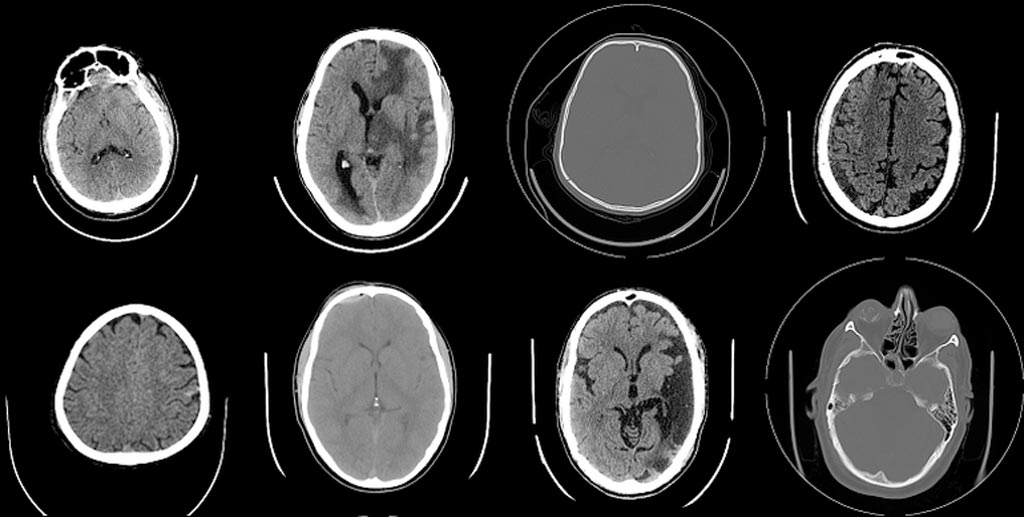AI-Powered Technology Identifies Abnormalities in CT Scans
|
By MedImaging International staff writers Posted on 30 Apr 2018 |

Image: The new AI-powered technology can accurately identify bleeds, fractures and other critical abnormalities in head CT scans and generate reports (Photo courtesy of Qure.ai).
A new artificial intelligence (AI)-powered technology can accurately identify bleeds, fractures and other critical abnormalities in head CT scans, and can automatically generate abnormality reports. These automated reports are a first-to-market capability in the AI and radiology category, helping radiologists and hospitals prioritize care, make smarter and faster diagnoses and reduce costs.
The new head CT scan technology has been launched by Qure.ai (Mumbai, India), a healthcare AI startup, which focuses on making healthcare affordable and accessible using the power of AI. Its deep neural networks can understand and interpret medical images accurately and enable machines to perform routine diagnostics, thus improving healthcare outcomes and costs. Until now, Qure.ai has delivered AI-powered chest, abdomen and musculoskeletal image interpretation technology. The company has now launched capabilities for head and brain CT scans for the first-time.
Qure.ai trained the new AI using a collection of 313,318 anonymized head CT scans, along with their corresponding clinical reports. Out of these, 21,095 scans were used to validate the AI's algorithms. Finally, the AI was clinically validated on 491 CT scans, with the results compared against a panel of three senior radiologists. The validation study found that Qure.ai's AI to be more than 95% accurate in identifying abnormalities.
The company has also made a dataset of 491 AI-interpreted head CT scans, as well as the corresponding interpretations from the three radiologists, publicly available for download. This dataset is from the Centre for Advanced Research in Imaging, Neurosciences and Genomics, and includes both outpatient and in-patient scans from seven centers.
"Qure.ai's new head CT scan technology rapidly screens scans in under 10 seconds to detect, localize and quantify abnormalities, as well as assess their severity," said Prashant Warier, Co-Founder and CEO, Qure.ai. "This enables patient prioritization and the appropriate clinical intervention."
"We are delivering near-radiologist accurate AI to support radiologists, physicians and healthcare providers," said Sasank Chilamkurthy, AI Scientist, Qure.ai. "Our deep learning algorithms can accurately detect and highlight head CT scan abnormalities, reducing the chances of missing a diagnosis. Our technology can also localize the brain regions affected and quantify the bleed regions in a fully-automated report."
Related Links:
Qure.ai
The new head CT scan technology has been launched by Qure.ai (Mumbai, India), a healthcare AI startup, which focuses on making healthcare affordable and accessible using the power of AI. Its deep neural networks can understand and interpret medical images accurately and enable machines to perform routine diagnostics, thus improving healthcare outcomes and costs. Until now, Qure.ai has delivered AI-powered chest, abdomen and musculoskeletal image interpretation technology. The company has now launched capabilities for head and brain CT scans for the first-time.
Qure.ai trained the new AI using a collection of 313,318 anonymized head CT scans, along with their corresponding clinical reports. Out of these, 21,095 scans were used to validate the AI's algorithms. Finally, the AI was clinically validated on 491 CT scans, with the results compared against a panel of three senior radiologists. The validation study found that Qure.ai's AI to be more than 95% accurate in identifying abnormalities.
The company has also made a dataset of 491 AI-interpreted head CT scans, as well as the corresponding interpretations from the three radiologists, publicly available for download. This dataset is from the Centre for Advanced Research in Imaging, Neurosciences and Genomics, and includes both outpatient and in-patient scans from seven centers.
"Qure.ai's new head CT scan technology rapidly screens scans in under 10 seconds to detect, localize and quantify abnormalities, as well as assess their severity," said Prashant Warier, Co-Founder and CEO, Qure.ai. "This enables patient prioritization and the appropriate clinical intervention."
"We are delivering near-radiologist accurate AI to support radiologists, physicians and healthcare providers," said Sasank Chilamkurthy, AI Scientist, Qure.ai. "Our deep learning algorithms can accurately detect and highlight head CT scan abnormalities, reducing the chances of missing a diagnosis. Our technology can also localize the brain regions affected and quantify the bleed regions in a fully-automated report."
Related Links:
Qure.ai
Latest Industry News News
- GE HealthCare and NVIDIA Collaboration to Reimagine Diagnostic Imaging
- Patient-Specific 3D-Printed Phantoms Transform CT Imaging
- Siemens and Sectra Collaborate on Enhancing Radiology Workflows
- Bracco Diagnostics and ColoWatch Partner to Expand Availability CRC Screening Tests Using Virtual Colonoscopy
- Mindray Partners with TeleRay to Streamline Ultrasound Delivery
- Philips and Medtronic Partner on Stroke Care
- Siemens and Medtronic Enter into Global Partnership for Advancing Spine Care Imaging Technologies
- RSNA 2024 Technical Exhibits to Showcase Latest Advances in Radiology
- Bracco Collaborates with Arrayus on Microbubble-Assisted Focused Ultrasound Therapy for Pancreatic Cancer
- Innovative Collaboration to Enhance Ischemic Stroke Detection and Elevate Standards in Diagnostic Imaging
- RSNA 2024 Registration Opens
- Microsoft collaborates with Leading Academic Medical Systems to Advance AI in Medical Imaging
- GE HealthCare Acquires Intelligent Ultrasound Group’s Clinical Artificial Intelligence Business
- Bayer and Rad AI Collaborate on Expanding Use of Cutting Edge AI Radiology Operational Solutions
- Polish Med-Tech Company BrainScan to Expand Extensively into Foreign Markets
- Hologic Acquires UK-Based Breast Surgical Guidance Company Endomagnetics Ltd.
Channels
Radiography
view channel
Machine Learning Algorithm Identifies Cardiovascular Risk from Routine Bone Density Scans
A new study published in the Journal of Bone and Mineral Research reveals that an automated machine learning program can predict the risk of cardiovascular events and falls or fractures by analyzing bone... Read more
AI Improves Early Detection of Interval Breast Cancers
Interval breast cancers, which occur between routine screenings, are easier to treat when detected earlier. Early detection can reduce the need for aggressive treatments and improve the chances of better outcomes.... Read more
World's Largest Class Single Crystal Diamond Radiation Detector Opens New Possibilities for Diagnostic Imaging
Diamonds possess ideal physical properties for radiation detection, such as exceptional thermal and chemical stability along with a quick response time. Made of carbon with an atomic number of six, diamonds... Read moreMRI
view channel
New MRI Technique Reveals Hidden Heart Issues
Traditional exercise stress tests conducted within an MRI machine require patients to lie flat, a position that artificially improves heart function by increasing stroke volume due to gravity-driven blood... Read more
Shorter MRI Exam Effectively Detects Cancer in Dense Breasts
Women with extremely dense breasts face a higher risk of missed breast cancer diagnoses, as dense glandular and fibrous tissue can obscure tumors on mammograms. While breast MRI is recommended for supplemental... Read moreUltrasound
view channel
New Incision-Free Technique Halts Growth of Debilitating Brain Lesions
Cerebral cavernous malformations (CCMs), also known as cavernomas, are abnormal clusters of blood vessels that can grow in the brain, spinal cord, or other parts of the body. While most cases remain asymptomatic,... Read more.jpeg)
AI-Powered Lung Ultrasound Outperforms Human Experts in Tuberculosis Diagnosis
Despite global declines in tuberculosis (TB) rates in previous years, the incidence of TB rose by 4.6% from 2020 to 2023. Early screening and rapid diagnosis are essential elements of the World Health... Read moreNuclear Medicine
view channel
New Imaging Approach Could Reduce Need for Biopsies to Monitor Prostate Cancer
Prostate cancer is the second leading cause of cancer-related death among men in the United States. However, the majority of older men diagnosed with prostate cancer have slow-growing, low-risk forms of... Read more
Novel Radiolabeled Antibody Improves Diagnosis and Treatment of Solid Tumors
Interleukin-13 receptor α-2 (IL13Rα2) is a cell surface receptor commonly found in solid tumors such as glioblastoma, melanoma, and breast cancer. It is minimally expressed in normal tissues, making it... Read moreGeneral/Advanced Imaging
view channel
First-Of-Its-Kind Wearable Device Offers Revolutionary Alternative to CT Scans
Currently, patients with conditions such as heart failure, pneumonia, or respiratory distress often require multiple imaging procedures that are intermittent, disruptive, and involve high levels of radiation.... Read more
AI-Based CT Scan Analysis Predicts Early-Stage Kidney Damage Due to Cancer Treatments
Radioligand therapy, a form of targeted nuclear medicine, has recently gained attention for its potential in treating specific types of tumors. However, one of the potential side effects of this therapy... Read moreImaging IT
view channel
New Google Cloud Medical Imaging Suite Makes Imaging Healthcare Data More Accessible
Medical imaging is a critical tool used to diagnose patients, and there are billions of medical images scanned globally each year. Imaging data accounts for about 90% of all healthcare data1 and, until... Read more






















